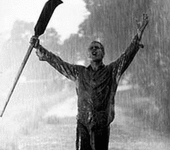|
Replies: 3
| visibility 53
|
Top TigerNet [32222]
TigerPulse: 100%
55
|
Religious Pron - Mesopotamia 5
Aug 10, 2022, 2:20 PM
|
|
…..

…..
There might be no crying in baseball, but there was a lot of crying in Mesopotamia. Mostly because people kept getting their cities and their lives destroyed over and over and over again. So to feel a little better about it they wrote about it. And they called these written crying sessions lamentations.
…..
The Lamentation of Ur, 2000 BCE

…..
There are quite a few of these lamentations, which you might expect from a place as violent as Mesopotamia. You might have even heard of the ones that made it into the Bible. But there were so many lamentations from all over that they became somewhat of a regional literary genre in the Middle East.
…..

…..
…..

…..
Lamentations are usually a combination of both a poem and song, meant to be repeated over and over and sung in the manner of a somber dirge. Of course, only those lucky enough to survive said disasters could sing about the constant destruction that never seemed to end.
….
Ur, 2004. More destruction.

….
These lamentations are incredibly sad. Very vivid accounts of people’s lives being upended not only by nature, but by their rotten, sorry-axxed neighbors, too.
Man always seems to find a reason, and a way, to kill each other. That’s a pretty common historical thread.
…..

…
…..

….
This is from the Lamentation of Ur, slightly paraphrased for clarity, where the people are described as sheep, helpless and abandoned before a coming storm. It’s a frequently used metaphor that carries through from Sumer all the way up to the New Testament, 2500 years later. This lament is told in multiple parts, from multiple perspectives, starting with an anonymous narrator. Here’s a taste…
“The lord of all the lands has abandoned [Ur] and has let the breezes haunt his sheepfold.
(The god) Nanna has abandoned Ur and has let the breezes haunt his sheepfold.
In his destroyed Ur, the lament is bitter, the lament made for you.
How long will your bitter lament grieve Nanna who weeps?
O brick-built Ur, the lament is bitter, the lament made for you.”
…..
Ur was very, very proud of their bricks. And who wouldn’t be? That was cutting edge technology in 2000 BCE, and they still work today. They even described their city as “Brick-Built Ur” in their lament.
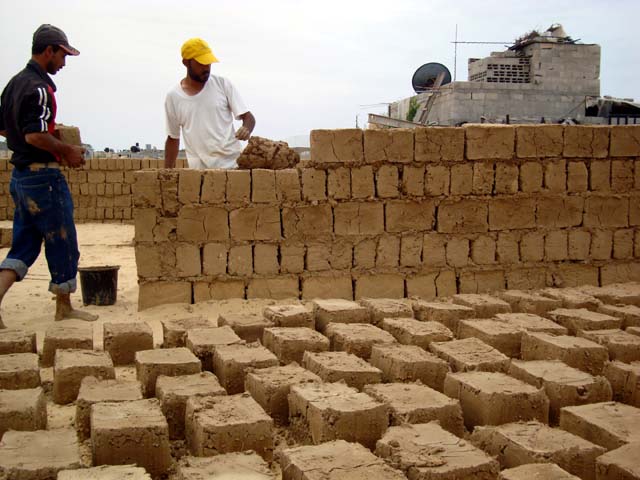
…..
…..
Here’s Ur in better days

….
Then the lamentation gets a bit more personal, with the king of Ur crying out concerning his own fate:
“My house has been given over to tears which [the gods] granted to me as my lot and share.
Ur, my home, my house, and the smitten city, all have been uprooted.
Like a shepherd's sheepfold it has been uprooted.
The swamp has swallowed my possessions, accumulated in the city.
Ur has been given over to tears.”
….
The Police wrote a song about similar feelings

…..
And then the lament gets even more personal, as the king pleas for his beloved city and people, explaining that he did all that he could do to save the city, but to no avail.
"Truly I shed my tears before [the god] An.
Truly I myself made supplication to [the god] Enlil.
"Let not my city be destroyed," I implored them.
"Let not Ur be destroyed," I implored them.
"Let not its people perish," I implored them.
But An did not change his mind. Enlil did not soothe my heart with an "It is good -- so be it".
I prostrated myself and stretched out my arms.
[Still] they gave instructions that Ur should be utterly destroyed.
They decreed its destiny - that its people should be killed.
In return for the speech which I had given them, they bound me together with my [city].
An is not one to change his command, and Enlil does not alter what he has uttered."
…..
Pretty grim, huh? Unanswered prayers often are.
….
The sky god An (note the wings.) A powerful dude, but he’s not so big on mercy. And his word is apparently final.

…..
And finally, the inhabitants of Ur themselves cry out. Here’s a merchant/farmer, one of many...
“In the fields of my city there is no grain, their farmer is gone.
My fields have grown tangled weeds.
My orchards and have grown mountain thornbushes.
He who came from the south has carried my possessions off to the south -- I shall cry "O my possessions".
He who came from the highlands has carried my possessions off to the highlands -- I shall cry "O my possessions".
My silver, my gems, my lapis lazuli have been scattered about -- I shall cry "O my possessions".
Men ignorant of silver have filled their hands with my silver.
Men ignorant of gems have fastened my gems around their necks.
My small birds and fowl have flown away -- I shall say "Alas, my city".
…..

…..
The lament is a tragic reckoning with a harsh reality, but also an indication of how materially wealthy Ur was at that time. A good life lost. And no one like to lose their stuff, much less their life.
We’ll cover a few more lamentations after the main poast.
++++++++++++++++++++
We’ve been working our way through ABaCAB, and so the last couple of posts have covered the rise of the Sumerians, who then fell to the Akkadians, who themselves fell to the short-lived Gutian monkey-men.
…..

…..
…..

…..
Another consequence of the breakup of the large and powerful Akkadian Empire was the re-emergence of the city of Ur, who had been one of the members of the previous Sumerian Empire.
Ur was just one of the many cities that was beaten down when Sumeria was conquered by Akkad, and so without their Akkadian overlords holding them down, Ur went right back to empire building, whack-a-mole style.
…..

…..
This Ur renaissance is actually the third dynasty of the very, very, old city. The first dynasty would have been during Ur’s time in the Sumerian Empire, and the second dynasty or may not have actually existed, depending on how certain academics define it. But everyone agrees the third time around Ur was the real deal, and so this bunch is typically called Ur III.
…..
King Shulgi, ruler of Ur III for 48 years. He followed King Ur-Nammu (you might remember his Code of Law from an earlier post). Ur-Nammu was the guy who broke from Akkadian/Gutian rule, and this guy was his successor.

…..
…..
Another image of King Shulgi

…..
Ur III occupied a lot of the same area the Akkadian Empire had ruled, but its new empire was only about half the size of the Akkadian one. This map shows Ur III’s expanding influence over time. Right on over to Canaan. But we are years ahead of Moses still. A good 800-1000 or so.
…..
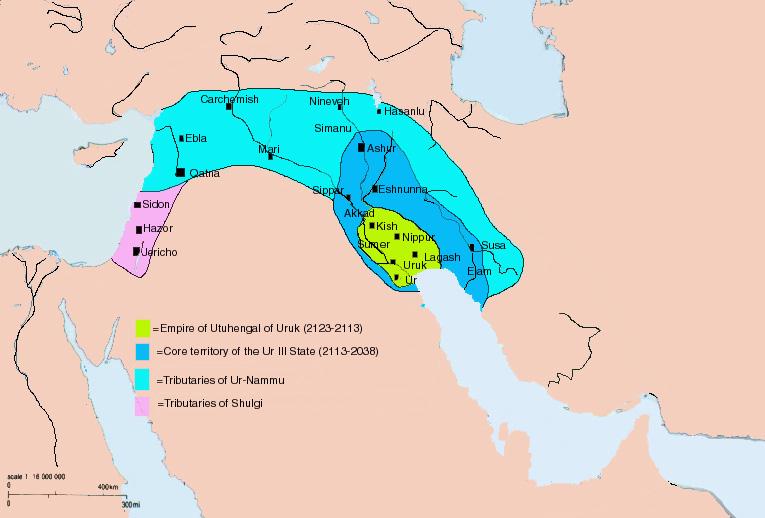
….
The rulers of Ur III continued to develop and refine all types of new technologies, like surveying. Here’s a plot plan of the nicely organized, squarish city of Umma (not to be confused with Umma gumma, mamma gamma, or mamma jamma). The site plan was portable and could easily fit in your pocket for quick reference.
…..

….
…..
:format(jpeg):mode_rgb():quality(40)/discogs-images/R-1716430-1238849842.jpeg.jpg)
…..
…..

…..
…..

….
And here’s the real thing. The city of Umma. Those holes aren’t bomb craters, they’re robber holes dug by tomb raiders looking for booty.
…..
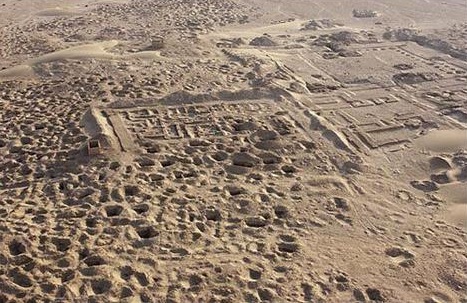
….
…..
Sample booty

…..
The Ur III dynasty finally met its end when it tangled with its neighbors, the Elamites to the East. But the Elamites were of a whole other cultural and religious tradition, and they had no interest in living in Mesopotamia. Smart. That place would get you killed.
So once Elam defeated Ur III, they mostly went right back home and went on to become a part of the Persian Empire a couple thousand years later. We’ll get back to “mostly” in just a second.
….
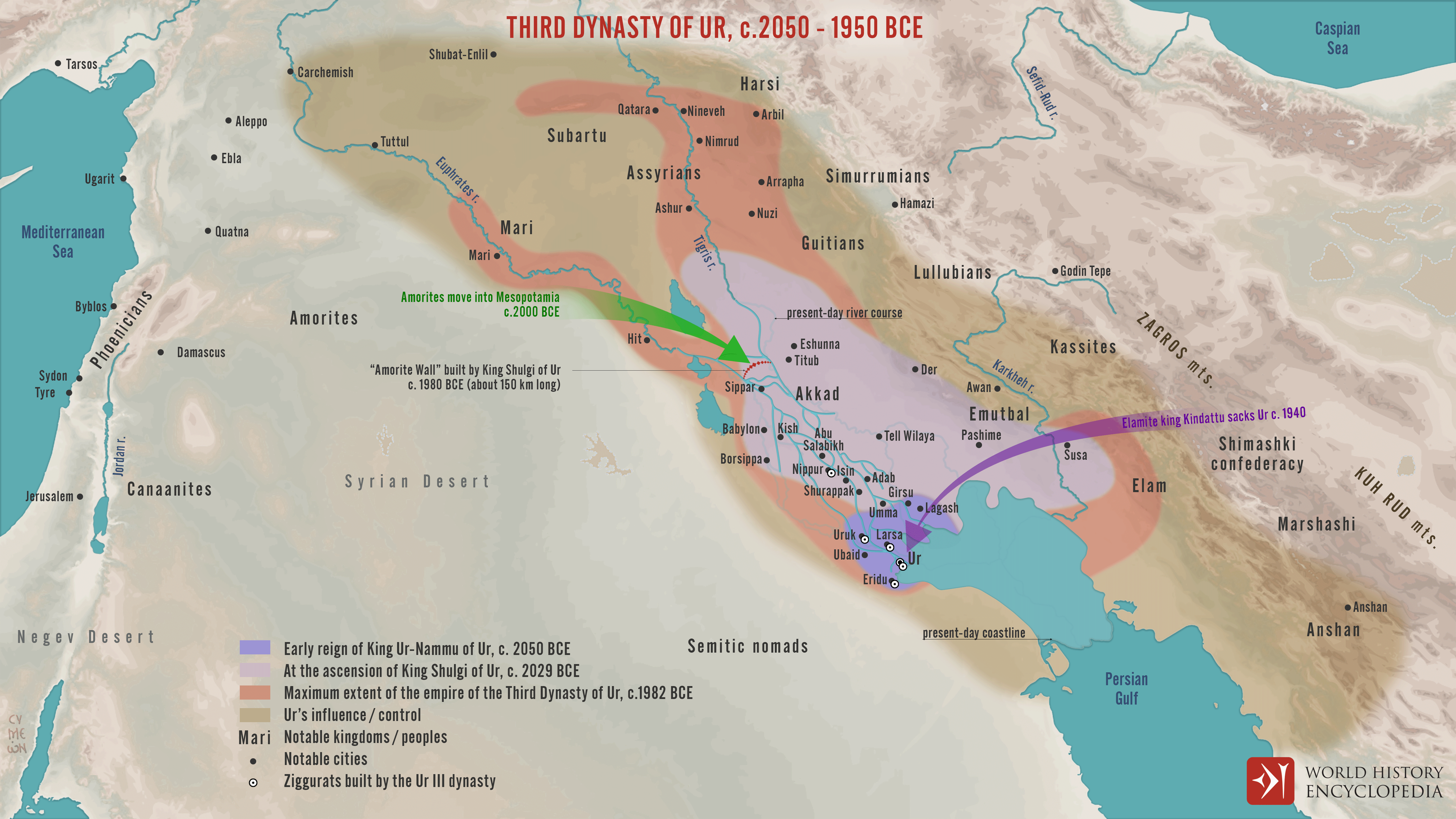
…..
Ur III’s overall impact on history was pretty minor, but King Shulgi did build one of the first recorded border walls to keep out pesky Amorite (Hebrew) nomads. You can see it in the pic above. The nomads that got through before the wall went up built a city called Babylon, just south of the red line on the map.
I might have skipped Ur III all together in our story except for two things. One is that is that religiously, Ur III is “traditionally” the Ur that Abram of Ur came from, timing wise. You know, that old guy in the Bible who is the father of three religions – Judaism, Christianity, and Islam. So this is kind of the historical start point for the rest of the Western religious thread.
Abram, Terah’s son, had a big calling coming up after his clan moved to the city of Haran from Ur III. And it’s a good thing they all got out of Ur III, because you know how safe and stable life was in southern Mesopotamia.
…..
You kinda want to stay by the rivers if you are moving in that part of the world.

…..
The second reason I’m talking about Ur III and its nemesis Elam is because Elam also appears in Genesis 14. Elam got into in a war with Sodom and Gomorrah of all people. The famous Sodom and Gomorrah. So when I said earlier that Elam mostly kept to themselves, that’s generally, over the centuries. Genesis 14 gives us an exception. Here it is:
“At the time when Amraphel (possibly the ruler after Shulgi) was king of Shinar (Sumer), Arioch king of Ellasar, Kedorlaomer king of Elam and Tidal king of Goyim, these kings went to war against Bera king of Sodom, [and] Birsha king of Gomorrah…All these latter kings joined forces in the Valley of Siddim (that is, the Dead Sea Valley). For twelve years they had been subject to Kedorlaomer, but in the thirteenth year they rebelled.”
…..
The Valley of Sidom and the Battle of Nine Kings, as the Bible tells it…
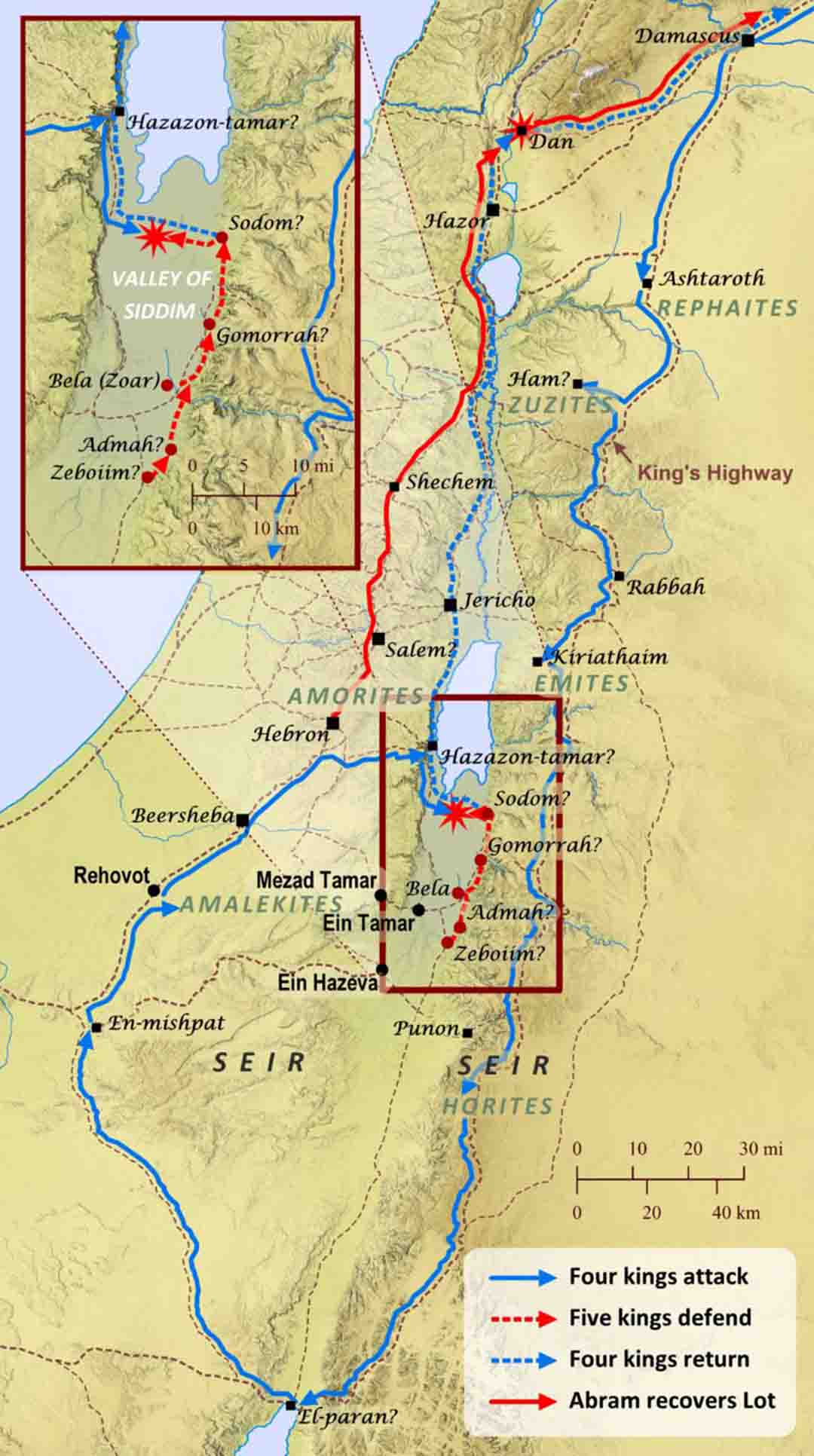
…..
So Elam did get around a bit, for the Bible tells me so. After this Battle of Nine Kings (as the Elamite incursion into Canaan is sometimes called), Sodom and Gomorrah were sacked, and captives, including Abraham’s nephew Lot, were marched north. You can read all about it in Genesis 14. There’s probably a lamentation about it lost forever somewhere in the sands of the Levant, too.
Abraham then launched a commando raid with 318 men to recover some of the stolen goods and rescue his nephew from the Elamites. It’s a riveting tale that would impress even Alistair McLean, and I highly recommend it. 5 stars.
…..

…..
….
I think that’s Abraham up front with the armor and horse (from the Hyksos, mind you)

…..
Now, there is a LOT more juicy stuff in this story with Elam and Sodom and Gomorrah that I can’t get to just yet or this post would be 3 times longer than it already is. So in the tradition of my best cliffhangers, I’ll save that surprise topic till next time.
…..

…..
Well, that would be the obvious conclusion given we’re talking about Sodom and Gomorrah, but this is stuff that’s even more exciting than butt seggs.
It’s clues to the religions that existed in the Levant even before Judaism did. Maybe. Or, it’s an ancient political rewriting of history to justify the primacy of Judaism over those early religions. Maybe. No one is quite sure.
In any event, it’s a real live mystery, and we’ll get deeper into it in the next post. Till then, enjoy some more laments, and some tiddehs.
+++++++++++++++++++++
Back on the topic of laments, here’s another tragic recounting from the Lament of Sumer (the region). This part is specifically about the city of Eridu, the very first city ever, according to the Sumerians themselves.
It’s a story of just one of the many times Eridu, like all the cities around it, was destroyed, then redestroyed, then redestroyed, again and again and again.
…..
Ancient Eridu, at the bottom of the map
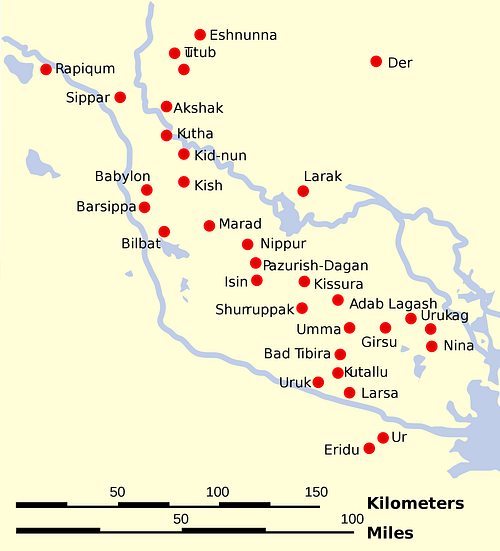
Then…
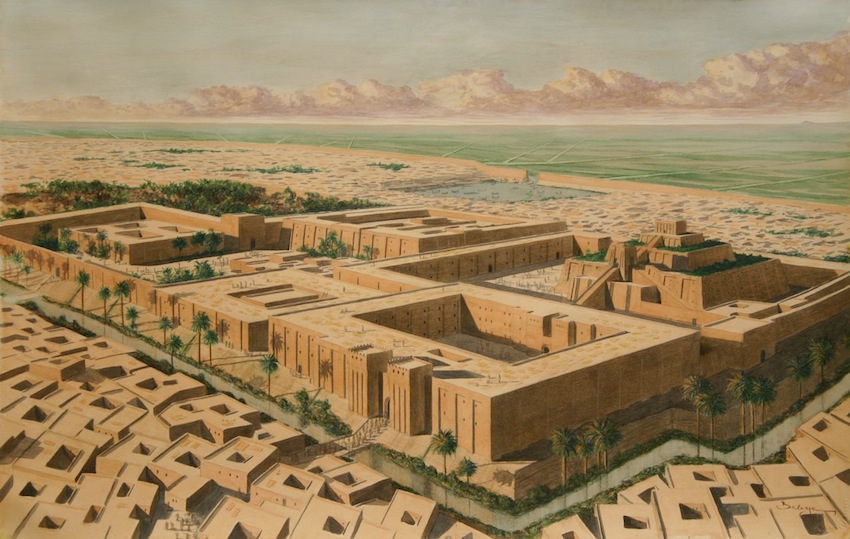
And now…

…..
The Lament of Eridu
“We have been struck down like beautiful boxwood trees.
The Gutians [those bast**ds], the vandals, are wiping us out.
We turned to father [god] Enki.
What can we say, what more can we do?
No one went to fetch food, no one went to fetch water. [it was too dangerous]
Those who went to fetch food, went away and will not return.
Those who went to fetch water, went away and will not return.
To the south, the Elamites stepped in, slaughtering us.
In the uplands, the vandals stepped in, slaughtering us.
Like a great charging wild bull, our city bowed its neck to the ground.
What did [the god] Enlil, who decides the fates, then do?
Again he sent down the Elamites, the enemy, from the mountains.
……
Enlil, you are one heartless bast---. Eridu is already down like a beaten bull, and you send more enemies still.
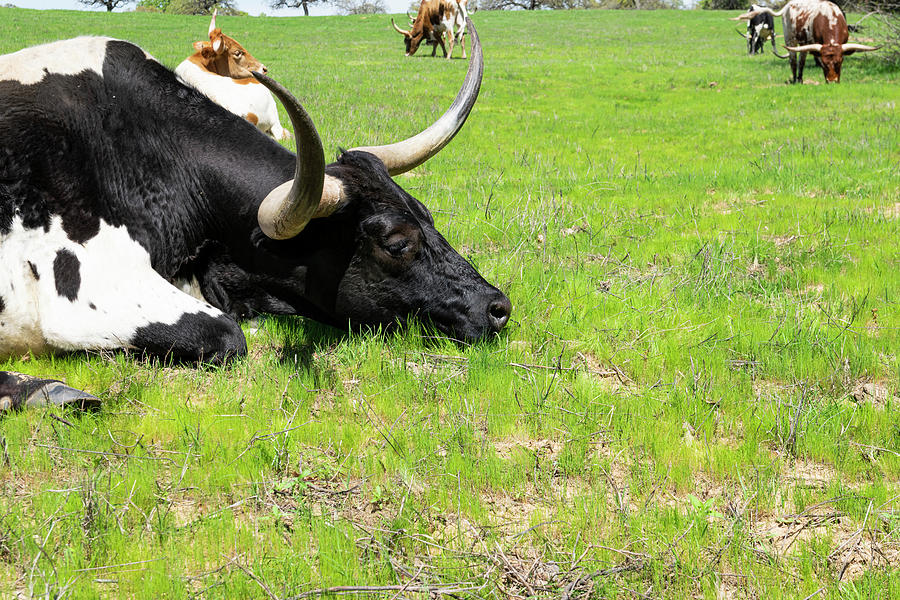
…..
It got so bad that even the gods themselves try to stop the slaughter in this lament…
“In his grief [the god] Suen approached his father.
He went down on his knee in front of Enlil, the father who begot him:
"O father who begot me, how long will the enemy be cast upon my [city], how long?”
“Look into your darkened heart.”
“O father Enlil, the fate that you have decreed cannot be explained.”
…..
Father Enlil. Sure he just looks like a lump of clay here, but Enlil don’t take no **** from anybody, and his word is final, too. Mesopotamians have harsh, harsh gods. Forget love and compassion. That’s still a looong way off as far as gods are concerned.

…..
So Mesopotamian life was grim, but they did see it all as cyclical. Like crops, or moon phases, or tides, or seasons, or the constellations of the night sky, or anything else. That’s pretty advanced thinking, really, and it certainly shows a keen awareness of their surroundings. What comes around, goes around.
…..

…..
Check out Enlil’s response to his son’s pleas. It all comes back around.
“Enlil then provided a response to his son [the god] Suen:
My son, the city built for you in joy and prosperity was given to you as your reign.
The destroyed city, the walls with broken battlements: all this too is part of that reign.
As for [your temple], it shall be rebuilt in splendor, the people shall bow down to you [again].
There is to be bounty at its base, there is to be grain.
There is to be splendor at its top, the sun shall rejoice there.
The city whose fate was pronounced by An will be restored for you."
So it’s not all bad. Just give it a little time. You’re a god, and since we’re immortal, don’t sweat it. Why fret over the petty affairs of humans?
It’s all very matter-of-fact in their writings, and they learn to deal with it, and the overall message is that humans are just temporal playthings for the immortal gods.
…..
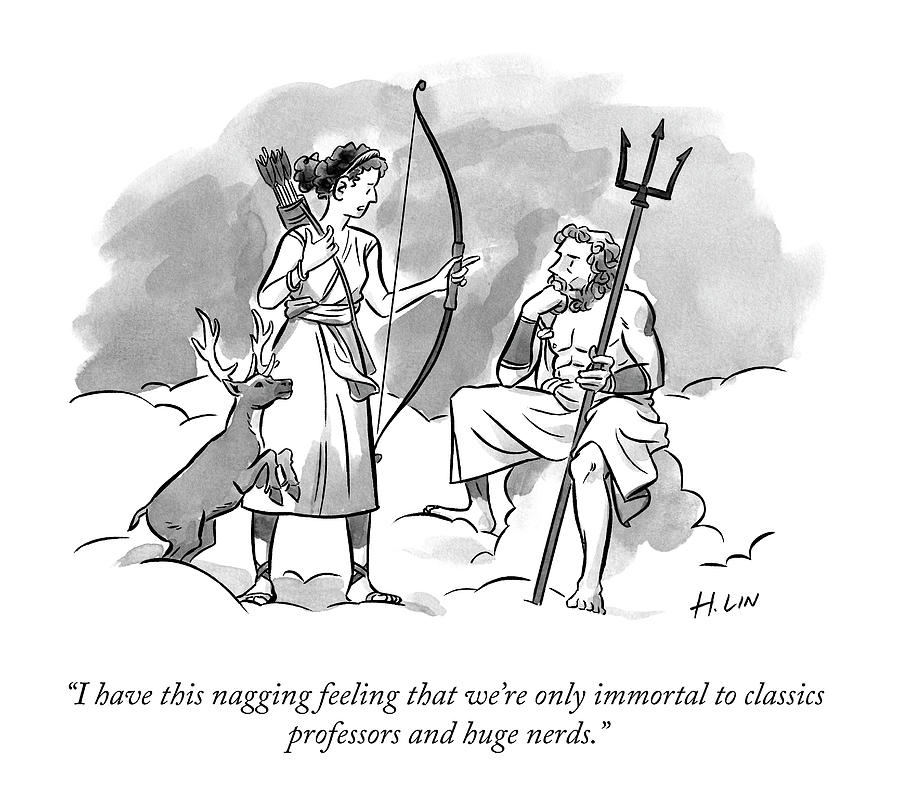
…..
Maybe this would have made them feel better about their limited time on earth…
…..


…..
|
|
|
|
 |
Ultimate Tiger [34387]
TigerPulse: 100%
56
Posts: 17457
Joined: 2014
|
Re: Religious Pron - Mesopotamia 5
Aug 10, 2022, 2:30 PM
|
|
Guess people have been singing the Blues for a while.
|
|
|
|
|
 |
Top TigerNet [32222]
TigerPulse: 100%
55
|
Re: Religious Pron - Mesopotamia 5
Aug 10, 2022, 2:36 PM
|
|

|
|
|
|
|
 |
Ultimate Clemson Legend [103196]
TigerPulse: 100%
64
Posts: 99153
Joined: 2009
|
|
|
|
|
|
Replies: 3
| visibility 53
|
|
|
 to award
the award.
to award
the award.



















:format(jpeg):mode_rgb():quality(40)/discogs-images/R-1716430-1238849842.jpeg.jpg)





















